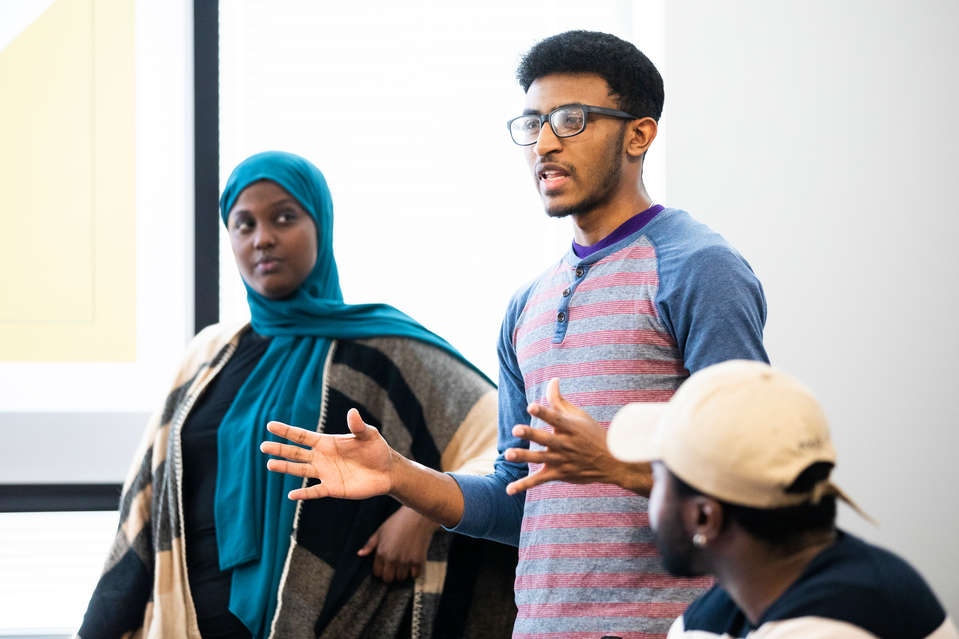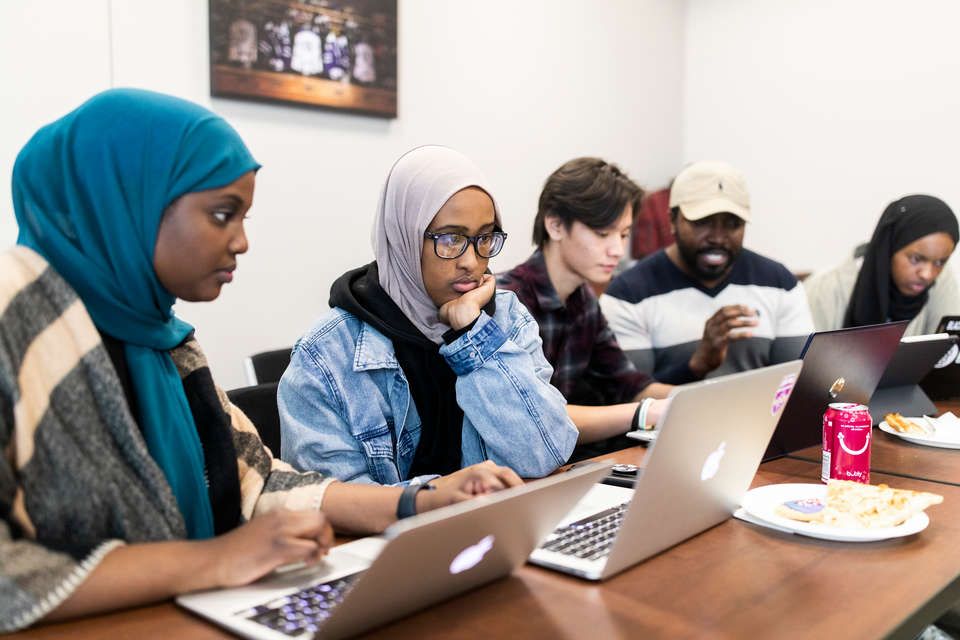Abby Andrade-Flores wasn’t messing around.
She was in line five hours early, and with good reason: The junior mechanical engineering major was at the national Society of Hispanic Professional Engineers conference in Phoenix last October, and the career fair was not something to be missed.
“This is such a great opportunity to get an internship; that was my mindset,” said Andrade-Flores, who did land an internship coming out of the conference. “The entire conference was an amazing experience.”
The experience was one Andrade-Flores shared with nine other St. Thomas students representing two student clubs on campus, the Society of Hispanic Professional Engineers (SHPE) and the National Society of Black Engineers (NSBE). Funded by the School of Engineering and a grant from Undergraduate Student Government, the trip is the latest example of the value the two growing clubs offer to students looking to enter the growing STEM fields, which remain predominantly white and male.
As both clubs’ numbers, programming options and networking opportunities have grown in the past year, students are looking to solidify that support as a permanent part of the St. Thomas experience.
“If you’re pursuing a STEM major and are a person of color, we want you to be aware of these opportunities and have access to these clubs that are well established,” said Faiza Hirsi , a senior computer science major and vice president of NSBE, who also attended the SHPE conference last fall. “I hope we continue attending the national conference and growing what we offer to students [for programming on campus and in the Twin Cities].”
Growing clubs, support
As the SHPE club describes it, “The purpose of the Society of Hispanic Professional Engineers University of St. Thomas Student Club is to empower the people of color in STEM at the St. Thomas community to realize their fullest potential and to impact the world by increasing educational opportunities, promoting professional and personal growth, achieving social equality and promoting STEM awareness.”
For NSBE, the mission “is to increase the number of culturally responsible black engineers and scientists, who excel academically, succeed professionally, and positively impact the community.”
NSBE is new in the past year, while SHPE’s recent growth is a resurgence of a club that has had a presence on campus for several years. Students from both clubs have made a point to collaborate as much as possible, broadening their goals and support to include all students of color at St. Thomas.

Abenezer Ayana speaks to fellow members of the National Society of Black Engineers (NSBE) student organization during their meeting in the Anderson Student Center on Feb. 27, 2020.
“Coming to St. Thomas, I felt lonely not seeing many students who look like me,” said Abenezer Ayana, a senior computer science major and president of NSBE’s St. Thomas chapter. Ayana emigrated from Ethiopia as a child and transferred to St. Thomas last year. “St. Thomas has so many resources. Many students don’t have these opportunities, access to 3-D printers, competitions like the Fowler to compete for funding. For students that are here, part of what these clubs offer is to help them become more successful and access those resources.”
Accessing the hidden agenda, curriculum
Along with accessing resources, Andrade-Flores said a huge goal of the clubs is to offer access to “the hidden agenda” of STEM higher education experiences.
“There are things a lot of white students are taught by their parents that many of us first-gen students don’t know as much about: getting internships, research opportunities, the professional side of education,” she said. “Things like reaching out to professors, even at St. Thomas, that can be hard. I was never told that for research opportunities you have to reach out to the professor. Because I knew that earlier, I want to make sure freshmen know that and other things.”
Dougherty Family College Associate Dean of Academic Buffy Smith has done extensive research on the aspects of a college or university Andrade-Flores referenced, deeming them a "hidden curriculum," an acute need for many first-generation or students of color who may not have accessed knowledge about STEM higher education from family members. For the first time this year, College of Arts and Sciences created a network of 12 advisers dedicated to helping about 90 first-generation and/or students of color in STEM fields; each student is paired specifically with advisers aligned with their academic interests and who are intentional about helping students acquire skills they may not have developed before arriving at St. Thomas.
"We’re not trying to change the students throughout that process; we’re trying to change how we respond to student needs," said Hugh Smeltekop, a program manager with CAS who started last year as part of the grant St. Thomas received in 2018, a five-year, $1 million Howard Hughes Medical Institute (HHMI) Inclusive Excellence Grant to support efforts to engage all students in STEM fields.
Networking is another huge component of offerings Andrade-Flores mentioned, a goal of the clubs echoed by several other members.
“That’s a huge part of why we have these clubs, to support our students in taking them to conventions and other events so they can put themselves out there to professionals,” Hirisi said. “Networking will get you an interview and your skills will get you a job. Network and network.”
Weekly meetings have also provided opportunities to bring professionals to campus, as well as to connect with fellow students and continuing growing the clubs’ presences on campus.
Going forward, growing support and collaboration with the clubs is a priority for both Student Diversity and Inclusion Services (SDIS) and programs across CAS and the School of Engineers.
“How do we continue to grow, what are the needs being met, and how do we understand best what students’ needs are now and in the future? How do students best support one another as they go through these things, the joys but also difficulties of being in STEM as students of color? Those are some of the questions we’re exploring,” said Alex Hernandez-Siegel, director of SDIS.
As the clubs continue to provide value to St. Thomas students, their members hope the opportunities and growth continue.
“We’ve started to build that foundation,” Andrade-Flores said. “Especially after going to this national conference I hope more people hear about this and join us.”







